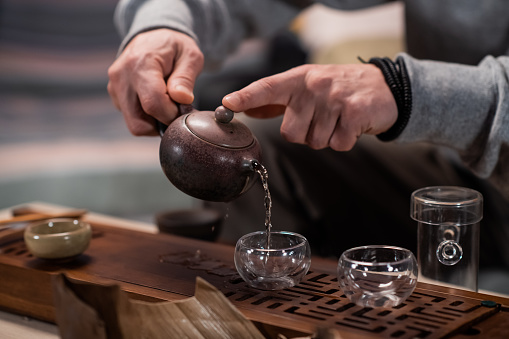Topic 4: What is the Chinese Tea Ceremony (chá dào)?
Brief Commentary
Tea has the same connotation for Chinese as coffee does for Westerners, according to new research. In China, however, tea is not simply a beverage, but also a symbol of energy, civilization, and art. (Tea Ceremony-Symbol of Chinese Tea Culture, n.d.-b). Tea has been a part of Chinese culture for centuries, and the Chinese believe that the tea ceremony promotes friendship, improves morality, and refreshes the mind. It has not only been woven into the daily lives of the Chinese people for thousands of years, but it was also invented by the Chinese people (Mayer et al., 2019).
The tea ceremony in China dates back to the Tang Dynasty and may be traced back to that time period (618-907). The bride’s family would carry tea as part of the bride’s dowry in ancient times to symbolise her devotion to her future spouse.
Learning Outcome(s):
After learning from this sub-topic, students will be able to…
- Comprehend cultural value of Chinese tea ceremony.
- Evaluate what occasions people will use Chinese tea ceremony (e.g. formal and informal occasions) and apply it in real life.

The New meaning of Chinese Tea Ceremony
However, in recent years, the tea ceremony, which is frequently held at weddings, has given tea a whole new meaning. On the wedding day, the tea ceremony is quite traditional. The groom and bride send tea to their parents and grandparents first, and then the elders would drink tea to represent their acceptance the new couples into their family (Everything you need to know about the Chinese tea Ceremony, 2021).
The tea ceremony has been practiced in China since the Tang Dynasty, and its origins may be traced back to that time period (618-907). Tea from the bride’s family was once given in her dowry as a symbol of the woman’s (Everything) devotion to her future husband.
The benefits when you drink Tea
There are so many benefits to drinking tea. For example, tea can refresh your mind, remove heat from your body, reduce calories and clear your stomach (Jiang, 2021).
When you incorporate drinking tea into your daily routine, it has huge health benefits:
- Drink it hot. Tea oxidizes quickly after brewing, and its nutrients diminish overtime. It is suggested that you drink it hot to get the best out of tea.
- Do not drink too much strong tea. It is likely to upset your stomach and cause insomnia if you make the tea too strong.
- The best time to drink is in between meals. Do not drink tea soon after or before meals. Otherwise it may quench appetite when your stomach is empty, or cause indigestion when your stomach is full.
- Do not drink with medication. Tea contains large amount of Tannin, which will react with certain elements in the medicine, thus reduce medical effects. You can drink tea a couple of hours after you take medicine.
- Green tea is the best option for office workers. Green tea contains catechins that help prevent computer radiation and supplement moisture content of the human body.
Learn the Youtube video about “how to play Chinese Tea Ceremony with Oolong tea”.
Interactive Activities
Online Discussion
- Welcome to talk about anything you know about the Chinese Tea Ceremony, after you watch the video you will have many feelings, and please share with others.
- Please click Here to share your opinion with others.
References
Everything You Need to Know About the Chinese Tea Ceremony. (2021, July 24). Brides.https://www.brides.com/chinese-tea-ceremony-5078037#the-history-and-meaning-of-the-tea-ceremony.
How to play Chinese Tea Ceremony with Oolong tea? 乌龙茶道英文演示. (2013, October 30). [Video]. YouTube. https://www.youtube.com/watch?v=5DYx20BkcGo
Jiang, F. (2021, October 2). Chinese Tea, Discover Chinese Tea Culture and History. China Highlights – Since 1998! https://www.chinahighlights.com/travelguide/chinese-tea/
Tea Ceremony-Symbol of Chinese Tea Culture. (n.d.). Chinese Tea Culture—Tea Ceremony. Retrieved October 10, 2021, from http://www.ichineselearning.com/chinese-culture/chinese-tea-culture.html.
Chinese Tea House. (n.d.). Chinese Tea House. https://www.chinatravel.com/culture/chinese-tea/tea-house